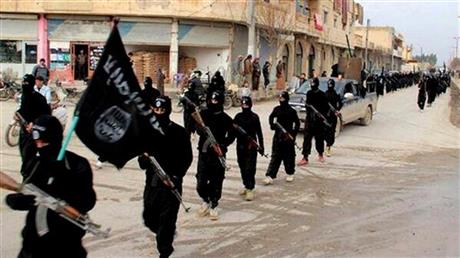
This undated file image posted on a militant website on Tuesday, Jan. 14, 2014 shows fighters from the al-Qaida-linked Islamic State of Iraq and the Levant (ISIL) marching in Raqqa, Syria. The Islamic State was originally al-Qaida’s branch in Iraq, but it used Syria’s civil war to vault into something more powerful. It defied orders from al-Qaida’s central command and expanded its operations into Syria, ostensibly to fight to topple Assad. But it has turned mainly to conquering territory for itself, often battling other rebels who stand in the way. (AP Photo/Militant Website, File)
BEIRUT (AP) — The al-Qaida-breakaway Islamic State of Iraq and the Levant has prevented food and medical supplies from reaching some neighborhoods in an eastern Syrian city, an activist group said Friday.
The Britain-based Syrian Observatory for Human Rights said the siege is mostly on rebel-held neighborhoods of Deir el-Zour. The Observatory said an offensive by the Islamic State in eastern Syria against rival Islamic rebel factions has killed more than 640 people and uprooted at least 130,000 since the end of April.
The Islamic State of Iraq and the Levant’s campaign in the oil-rich Deir el-Zour province appears aimed at linking the large expanse of territory under its control in northern and eastern Syria with areas it has captured in neighboring Iraq. It seized that country’s second largest city of Mosul and other areas earlier this week in a lightning advance toward Baghdad.
The group, which is largely composed of foreign jihadists, has made significant headway in Syria over the past six weeks, seizing towns and villages in heavy fighting against the al-Qaida-affiliated Nusra Front and other Islamic rebel groups.
The Islamic State recently captured a bridge on the Euphrates river that was the main entrance to rebel-held parts of the city, which is contested by rebels and government forces, the Observatory said.
The Observatory, which has a network of activists around Syria, said the Islamic State is preventing vehicles from entering or leaving the neighborhoods, which are home to 25,000 people.
“Some residents have informed activists with the Observatory that there is food only to keep residents inside the city alive,” it said.
Syrian government forces and rebels have besieged several areas over the course of the three-year civil war in a bid to starve out their opponents, a tactic that has been condemned by the United Nations and human rights groups.



